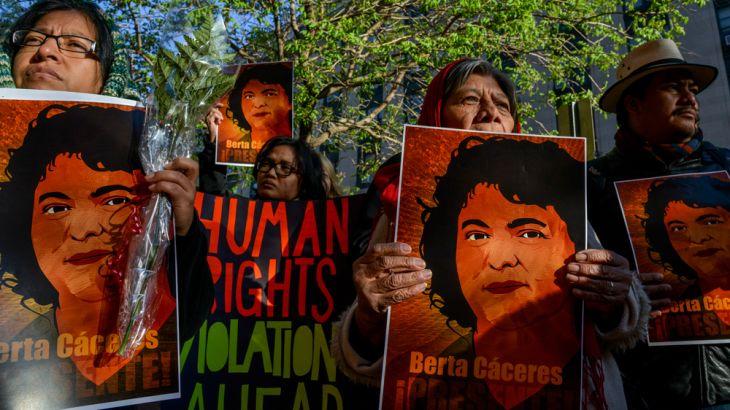
Honduras: Blood and the Water
Fault Lines travels to Honduras to investigate the death of environmental activist Berta Caceres.
In early March 2016, Honduras’s most prominent and outspoken environmental activist, Berta Caceres, was killed in her home. While shocking, her murder did not come as a surprise to her colleagues or family.
For years, Caceres had received thousands of threats because of her work, fighting for the rights of indigenous communities and for her attempts to stop a hydro-electric dam from being built on indigenous land.
Keep reading
list of 4 itemsTunis police raid sees refugees abandoned near the border with Algeria
UK has begun mass arrests of potential Rwanda deportees: What’s next?
World Press Freedom Day: Gaza conflict deadliest for journalists
”She
is not the only one, there are so many imprisoned, tortured, persecuted, threatened. They’ve had to leave their families resisting and defending their land. They are fighting against these projects that are an accumulation of capital and land. It’s the most dangerous job there is.”]
“Our Mother Earth – militarised, fenced in, poisoned, a place where basic rights are systematically violated – demands that we take action … The river is like blood running through your veins. It’s unjust. Not only is it unjust, it’s a crime to attack a river that has life, that has spirits,” Berta Caceres said.
Her death is the latest in a string of assassinations that have made Honduras one of the world’s most dangerous places for environmental activists.
“Knowing what my mum was fighting for, I always understood that there are dangers because there are bad people, business and powerful economic interests,” Laura Zuniga, Caceres’s daughter says.
In 2013, Caceres told a reporter from Al Jazeera that she believed the army had a hit list of activists with her name at the top. She did not take any of this lightly and repeatedly asked the Ministry of Security for protection. But the government didn’t seem to take her request seriously.
Just before midnight, on March 2, 2016, Caceres was shot dead inside her home.
So why was she killed? And what makes Honduras one of the most dangerous countries in the world for activists?
Fault Lines travels to Honduras to investigate the reasons behind the murder of Berta Caceres and to examine what is fuelling the war against land rights defenders and environmental activists.